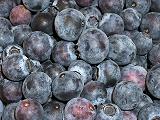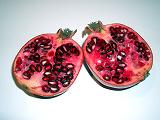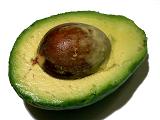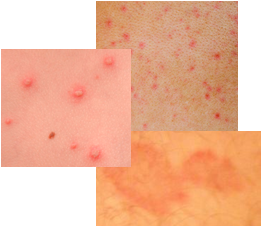- Home
- Food and Skin
- Food for Skin
The Best Food for Skin
Visit this
PICTURES OF RASHES PAGE
Are you searching to find the best food for skin health? Healthy skin can be obtained by using appropriate skin care products such as good quality cleansers and moisturizing lotions and creams. These products are external treatments. However, the internal aspect of skin care is often ignored. What we eat daily plays a significant role in the health of our skin as well.
The best skin care regime involves paying attention to both the external and internal needs of the skin. Skin requires nutrients derived from inside the body in order to protect itself from damage and replenish dead skin cells with new healthy cells. Eating the best food for skin goes a long way towards having the best and healthiest looking skin possible.
What is the best food for skin? There are many foods that if eaten regularly as part of an overall well-balanced diet will benefit the skin. However, some foods are better than others and eating these foods provides the extra nutrients required to boost your skin’s health and give you that great complexion you always wanted.
Best Food for Skin
Skin Benefits of Brazil Nuts
A Brazil nut is an excellent food for skin health. The reason is because Brazil nuts are an excellent source of the mineral selenium. Selenium improves the elasticity of skin, helps to battle skin infections, and is thought to help individuals with acne. Selenium is necessary for the production of glutathione, which neutralizes free radicals in the body that can lead to the deterioration of collagen and elastin in the skin. In addition to skin benefits, selenium improves the hair and nails.
These nuts are also a good for skin health because they contain zinc, which helps with skin inflammation problems, skin cell growth, maintenance of collagen and elastin, and dry skin related problems such as eczema and psoriasis. Turkey is another food that is high in the mineral zinc and provides similar benefits for the skin.
Brazil nuts and other nuts contain fatty acids that help to prevent skin dryness and the powerful antioxidants vitamin A and vitamin E, which contribute to anti-aging of skin and good overall skin health.
Carrots for Healthy Skin
Carrots are a good food for skin because they are a high source of beta-carotene. The body coverts beta-carotene to vitamin A for use within the body. Carrots are also a good source of vitamin C. Vitamin C is a powerful antioxidant that mops up free radicals, such as those produced by overexposure to the sun, that lead to the premature aging of skin. It also aids in skin collagen formation. Collagen helps skin look young and plump.
Vitamin A aids in the development of skin cells and the maintenance of proper skin cell health. A vitamin A deficiency can lead to dry skin.
Eating carrots can be a natural sunscreen, providing a SPF factor of 2 to 4 in people with light colored skin.
Sweet potatoes contain beta-carotene and vitamin C as well. In addition, these potatoes contain vitamin E. Vitamin E helps the body regenerate vitamin C and therefore is necessary in order to maximize the effectiveness of vitamin C. Foods that contain high quantities of vitamin C and vitamin E are very effective antioxidants for skin protection.
Berries - Antioxidants for Skin

Berries such as blueberries, blackcurrants, blackberries, rasberries, cranberries, and strawberries are a good food for skin. Generally, berries help the body manufacture collagen which makes the skin supple and smooth. Berries (especially blueberries) are loaded with antioxidant compounds that are very effective in neutralizing damaging free radicals (that lead to skin cell damage and premature skin aging) generated in the skin by excessive UV exposure or from other sources.
Blueberries and other berries are an excellent source of vitamin C, vitamin E, riboflavin, and soluble and insoluble fiber.
Pomegranate Juice and Spider Veins

Pomegranate juice contains anthocyanins that act to strengthen the walls of the tiny blood vessels that supply nutrients to the skin. Therefore, drinking pomegranate juice can help stop the formation of spider veins.
Salmon and Skin Health
Salmon and other oily fish (sardines, mackerel, fresh tuna ) play an important role in skin health. Salmon contains a high amount of omega-3 fatty acids which the body cannot manufacture on its own. These fatty acids improve the skin by decreasing the occurrence of clogged pores, reducing the body’s production of inflammatory agents that can lead to skin damage, reducing skin dryness and skin dryness related problems such as eczema, and improving the skin’s elasticity. These fatty acids are responsible for healthy cell membranes. They prevent harmful substances from entering the cells, but allow essential nutrients in.
Because these substances strengthen the cell membrane, they help to keep water in and keep the cells hydrated. This helps the skin maintain its proper moisture level resulting in skin that is plump and younger looking.
Salmon is also high in selenium, which improves various skin problems and overall skin health.
Avocados and Skin Anti-Aging

Avocados are high in fat, but most of the fat is monounsaturated and thus is considered a healthy fat. An avocado is a good food for skin because, as is the case with omega-3 fatty acids, it keeps skin plump and youthful looking and helps prevent dry skin.
Avocados contain both vitamin C and vitamin E, which act well together as a powerful skin anti-aging combination.
Sunflower Seeds and Psoriasis
Sunflower seeds provide a lot of vitamin E, a powerful antioxidant that helps slow down the aging of skin. The seeds also provide essential fatty acids that help keep the skin lubricated and soft. This food is thought to reduce the appearance of blackheads and acne, helps prevent psoriasis, and other skin problems such as atopic dermatitis.
Dairy Products for Proper Skin Health
Dairy products are a good food for skin because they provide vitamin A. As previously stated, vitamin A is important for proper skin health. Unlike foods containing beta-carotene, which is the precursor to vitamin A, dairy products provide vitamin A directly. Therefore, individuals with certain health problems that interfere with beta-carotene to vitamin A conversion will still get vitamin A into their bodies if they consumed sufficient amounts of dairy products.
Whole Grains
Whole grains, as can be found in certain breads and cereals, are a good food for skin because they are loaded with the B group vitamins. B group vitamins are essential for normal skin functioning. They are required for the growth of new cells, replacing those that have died, and help strengthen the skin against infections and stress. Specifically, whole grains help prevent the peeling and cracking of skin, rough skin on the hands and feet, and conditions such as mouth ulcers.
Green Tea and its Many Skin Benefits
Green tea is a valuable food for skin. It provides a wide range of benefits. It has anti-inflammatory properties and is thought to play a role in preventing certain types of skin cancers by reducing the risk of damage caused by the sun’s ultraviolet rays. Green tea is loaded with a variety of antioxidants and is a good food for skin and overall good body health. It is high in vitamins C, D, and K, as well as riboflavin, zinc, calcium, magnesium, and iron.
In addition to being a good food for skin, it is also used in skin creams in order to take advantage of its potent antioxidant activity directly on the skin.
skin care | food for healthy skin | food for skin | vitamin d benefits | benefits of vitamin e | benefit of zinc | foods that cause acne
